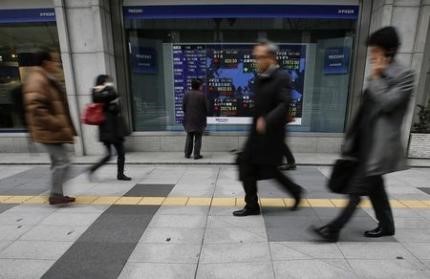By Shinichi Saoshiro
TOKYO (Reuters) - Asian stocks were mostly lower on Wednesday, taking their lead from weaker U.S. shares, while the dollar slid against the yen as Tokyo's Nikkei recoiled in volatile trade.
As share volatility rose, spreadbetters forecast a significantly lower open for Britain's FTSE (FTSE), Germany's DAX (GDAXI) and France's CAC (FCHI).
Crude oil prices continued to decline as negotiations between Iran and world powers over nuclear technology extended beyond a deadline.
The protracted negotiations have drawn attention due to their potential impact on crude supply of a settlement. Wall Street slid overnight, weighed by declines in the healthcare sector and in energy shares as oil prices contracted.
U.S. crude oil was down 0.3 percent at $47.46 a barrel
Asia's decliners included South Korean, Australian, Malaysian and Indonesian stocks. MSCI's broadest index of Asia-Pacific shares outside Japan (MIAPJ0000PUS) stood little changed, meandering in and out of the red.
Bucking the trend were Chinese equities, one of Asia's best performers last quarter thanks to hopes for more official monetary easing measures. The Shanghai Composite Index (SSEC) gained 1.4 percent with a soft Purchasing Managers' Index (PMI) reading the latest indicator to reinforce the case for more easing.
Japan's Nikkei was down 0.9 percent after losing as much as 1.4 percent in volatile trade as investors sold to lock in profits on the first day of the Japanese financial year. A lacklustre Bank of Japan business sentiment survey also weighed.
The dollar fell to as low as 119.42 yen
The euro was up 0.5 percent at $1.0787
The Greek debt crisis weighed on the common currency again after Athens failed on Tuesday to reach an initial deal on reforms with its lenders, a precondition for financial help.
Without a deal with the European Union and IMF, Athens faces the prospect of running out of money in a few weeks.
"The ECB's 18-month quantitative easing program only began in March and to this day, Greece is a ticking time bomb for the Eurozone," Kathy Lien, Managing Director of FX Strategy for BK Asset Management, said in a note.
Talks between six world powers and Tehran over Iran's nuclear programme extended past a March 31 deadline as the parties edged towards a deal but failed to agree to crucial details such as the lifting of U.N. sanctions.
The powers want Iran to accept restrictions on its nuclear programme in exchange for the lifting of export sanctions. A deal would in theory mean more crude from oil-rich Iran entering an already oversupplied market.
Still, some suggested that lifting of sanctions may not automatically mean an immediate, visible increase in global supply.
"Whether or not there is an Iranian nuclear deal, we do not expect a flood of oil into the market as a consequence," head of commodity markets strategy and oil strategy at BNP Paribas (PARIS:BNPP), Harry Tchilinguirian, told Reuters Global Oil Forum.

"Which sanctions will be lifted and the uncertainty in the timing of lifting suggest that Iran will not be in position to significantly add to the current oversupply in the market," he said.